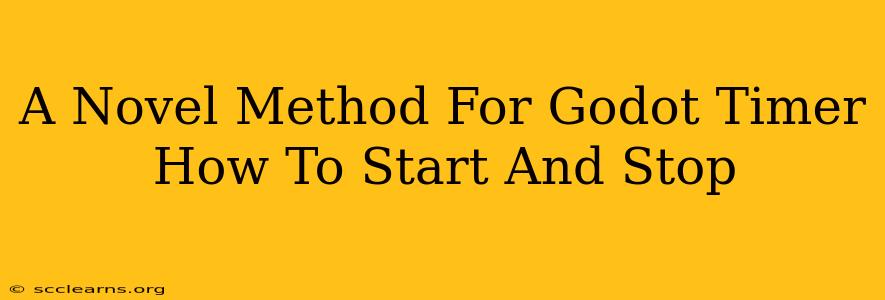Godot's built-in Timer node is straightforward, but sometimes you need more control or a more elegant solution for managing timers within your game. This post explores a novel approach to managing timers in Godot, providing a flexible and reusable method that transcends the limitations of the standard Timer node. We'll cover how to start, stop, and reset these custom timers, making your Godot game development smoother and more efficient.
Why Go Beyond the Standard Timer Node?
While Godot's built-in Timer node is sufficient for basic timing needs, it lacks flexibility in certain scenarios. For instance, managing multiple timers with varying behaviors or integrating timers seamlessly into complex game systems can become cumbersome. Our novel method offers a solution to these challenges.
Limitations of the Standard Timer Node:
- Limited Control: Stopping and restarting a Timer requires managing its
autostartandwait_timeproperties directly. This can become messy when dealing with multiple timers. - Single Functionality: Each Timer node is inherently tied to a single timeout event. Managing different timing needs requires creating multiple Timer nodes, increasing project complexity.
- Difficult Integration: Integrating the standard Timer into sophisticated game mechanics can lead to spaghetti code and reduced readability.
Implementing the Novel Timer System
This approach leverages Godot's Signal system and custom scripts for enhanced timer management. Instead of relying on multiple Timer nodes, we'll create a single, reusable script that handles multiple timers concurrently.
The TimerManager Script (GDScript):
extends Node
# Dictionary to store active timers
var timers = {}
func create_timer(timer_id, duration, autostart = false):
# Add new timer to the dictionary
timers[timer_id] = {
"duration": duration,
"elapsed": 0,
"running": autostart,
"callback": null
}
if autostart:
start_timer(timer_id)
func start_timer(timer_id):
if timer_id in timers and not timers[timer_id].running:
timers[timer_id].running = true
func stop_timer(timer_id):
if timer_id in timers:
timers[timer_id].running = false
func reset_timer(timer_id):
if timer_id in timers:
timers[timer_id].elapsed = 0
timers[timer_id].running = false
func set_timer_callback(timer_id, callback):
if timer_id in timers:
timers[timer_id].callback = callback
func _process(delta):
for timer_id in timers:
var timer_data = timers[timer_id]
if timer_data.running:
timer_data.elapsed += delta
if timer_data.elapsed >= timer_data.duration:
if timer_data.callback != null:
timer_data.callback.call(timer_id) # Call the callback function
stop_timer(timer_id) # Stop the timer after callback execution
Using the TimerManager Script:
- Attach the script: Add the
TimerManagerscript to a Node in your scene (e.g., a root Node). - Create a timer: Use
create_timer("my_timer", 5.0, true)to create a timer named "my_timer" with a duration of 5 seconds, starting immediately. - Start, stop, and reset: Use
start_timer("my_timer"),stop_timer("my_timer"), andreset_timer("my_timer")to control the timer's state. - Set a callback function: Define a function (e.g.,
_on_timer_complete) and associate it with the timer usingset_timer_callback("my_timer", self._on_timer_complete). This function will be called when the timer completes.
Benefits of this Novel Method
- Organized Timers: All timers are managed within a single script, improving code organization and maintainability.
- Flexibility and Reusability: The script is easily adapted to different timing needs across your game.
- Enhanced Control: Offers precise control over starting, stopping, resetting, and associating callbacks with timers.
- Scalability: Easily handles numerous timers simultaneously without the complexity of managing multiple Timer nodes.
- Improved Readability: Reduces code clutter and improves the overall clarity of your project.
This improved method provides a more sophisticated and efficient way to manage timers in Godot, leading to cleaner, more robust game development. Remember to adapt and expand upon this system to fit your specific game mechanics and requirements. This method empowers you to create more complex and engaging game experiences.

